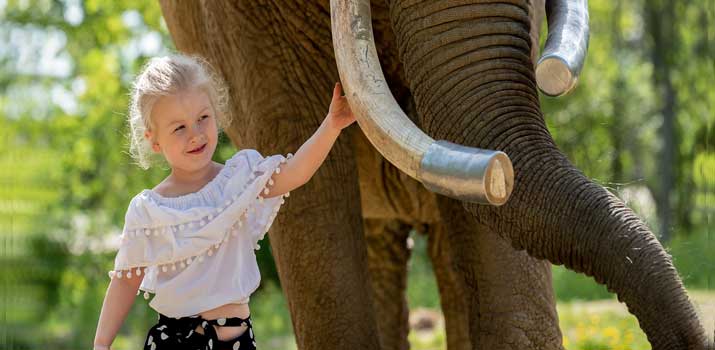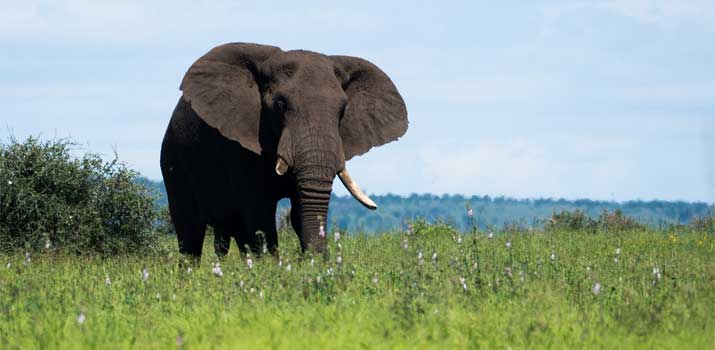
Elephants have a reputation for being gentle and compassionate. They’re often the subject of film and TV projects where they’re depicted as innocent, loving, and filled with human-like emotions.
In the real world, most people only have exposure to elephants in a zoo’s safe and controlled setting. We’re conditioned to see these giants as nothing more than massive mammals put on this planet to coexist with humans in peace.
But what’s the real story? Are elephants actually friendly, and do they enjoy being around humans like the fiction says?
The answer to that question is a little more complicated than you might think.
Understanding the Emotions of an Elephant
Before answering this question, we must dive deeper into how elephants think. These creatures are not like any other animal on this planet.
Experts believe they’re more capable of experiencing human-like emotions than most other species in the animal kingdom.
An elephant’s brain is considerably large, and the portion of the brain that deals with memories are much bigger than a human’s.
That’s why elephants are often said to never forget. It sounds like an old wives tale or a detail pulled from some sappy cartoon, but that tidbit of information has a basis in reality.
Elephants can remember fine details. They remember how to get to watering holes and food sources, and they can even make a mental note about the growth of plants!
Many elephants also learn important lessons about their surroundings, identifying potentially dangerous places and avoiding them in the future. What’s unique about elephants is that they pass this information on to younger generations.
While other animals have social hierarchies, elephants have some of the most complex.
At the top of the totem pole is a matriarchal elephant. Others in the group support one another, showing compassion, playing, and even mourning the death of others.
Elephants are incredibly sensitive creatures, and it’s not hard to see why people want them to live in harmony with humans.
Elephants and Human Relationships
So elephants have impeccable memories and are capable of having complex emotions. Does that mean that they are friendly to humans?
Ultimately, it all depends on how the elephant grew up and its experiences with humans.
At their core, elephants typically don’t want to cause harm to another living creature. They’re strictly herbivores and have nothing to gain from killing a human or any other animal.
But, they will use force if they feel like their safety or the safety of others in their unit is in danger.
Elephants Raised in Captivity
Generally, elephants raised in captivity get along well with humans. Of course, all animals are different, and the level of care provided makes a big difference.
Elephants kept in poor living conditions without much human interaction or enrichment will be less keen to get along with humans than those raised by humans from a young age.
In many ways, elephants are similar to dogs. When trained early, elephants can understand commands, follow a comfortable routine, and develop strong bonds with humans.
These are the most magical relationships, and elephants will not shy away from showing affection to the people they are most comfortable around.
They might vocalize their love, give hugs with their trunk, and more. Like all relationships, the elephant-human bond doesn’t happen overnight. It often comes from years of continued training and interaction.
Regular Exposure
The key is regular exposure. Like any other animal, elephants are wary of those who invade their personal space.
Regular interaction with humans assures these creatures that no threat exists, paving the way for peaceful coexistence.
Depending on the types of interactions the elephant has, it may be open to petting, riding, and other forms of contact.
Baby elephants are some of the most trusting of the bunch. They have the innocence of a newborn and haven’t had any experiences that would make them fear humans.
Most zoologists agree that it’s best to start conditioning elephants as early as possible. The longer they have to get comfortable around humans, the better!
Wild Elephants

Captive elephants with tons of human exposure are a joy. But what about their wild counterparts? Here’s where you have to be careful.
Let’s clarify one thing: You should never approach a wild elephant.
It doesn’t matter how many nature documentaries you’ve seen or how gentle the giant may seem. There’s a real threat of danger. More on that soon.
In the wild, elephants don’t have much exposure to humans.
Human exposure is rare, whether it’s the endangered Asian elephant roaming the jungles of India or the African Savannah elephant going through a cross-continent migration pattern.
Wild elephants usually have zero ideas what people are when they encounter them. As you can imagine, that creates some problems.
Most elephants will see you as a threat. They might not attack right away, but they indeed show signs of apprehension.
That all changes if you invade the elephant pack’s territory. When that happens, these animals can act unpredictably.
Some may charge your way to scare you off. Others might approach you and smell you with their trunks.
Whatever the case, don’t make the mistake of thinking you can befriend a wild elephant. Leave those dreams behind and get to safety as quickly as you can.
Are Elephants Dangerous?
To put it simply: Absolutely!
The sheer size of an elephant makes the animal a significant threat. It can take you out with a single stomp!
If you’re unlucky enough to get on the wrong side of an elephant pack, you could be on the other end of a stampede.
Don’t let the cutesy depictions fool you. A full-grown African elephant can weigh as much as 7,500 kilograms. That’s more than eight tons!
Now imagine how quickly things can go south if an elephant deems you enough of a threat that it needs to take action. Believe it or not, death by elephant stomping was a pretty common execution method in Southeast Asia.
These animals are fully capable of killing a human without batting an eyelash.
The good news? Elephants often give warning charges before going to extremes.
A threatened beast will run in your direction, forcing you to flee. Once you head out of the animal’s safe space, the attack will usually cease.
Remember: Elephants have nothing to gain from killing you or any other animals.
They have no problem doing so to protect themselves, their young, and the rest of the pack, but they will only go to those lengths when necessary.
Elephants and PTSD
Whether an elephant is living in captivity or roaming free in the wild doesn’t matter. If it has any negative experience with humans, all bets are off.
In the last century, about 90 percent of the elephant population was decimated due to poaching. Poachers killed these innocent animals for their ivory tusks. While modern laws exist to keep them protected, poaching still occurs.
Because elephants are so sensitive, they respond strongly to emotional trauma.
Witnessing the death of another elephant at the hands of a poacher often results in symptoms akin to PTSD. Pair that with the animal’s strong memory; some elephants will have an outright vendetta against humans.
Some of these giants can go through rehabilitation, but that’s an uphill battle. Distrust can exist regardless of how many years of positivity they experience.
In the case of elephants harmed by poachers, PTSD can make them more unpredictable and dangerous than purely wild elephants with no human interactions.
Can Elephants Form Bonds with Humans?
Ask anyone lucky enough to work with elephants regularly, and they’ll tell you that it’s not only possible but also a rewarding experience.
These animals are some of the smartest around. They can interact with humans in unique ways.
Elephants can use their trunks to interact and play. They also pick up on commands, putting on shows at zoos and circuses with trainers they trust.
Animal experts say that elephants can also distinguish between languages and human voices.
The type of relationships they form with humans can vary. Generally, they get close with trainers and caretakers. Both are associated with love and treats, leading to favorable, one-of-a-kind interactions.
Conclusion
You can’t compare elephants with any other creature in the animal kingdom. While other animal species can grow close to humans, what’s possible with elephants is nothing short of amazing.
That said, whether elephants like humans or not depends entirely on their upbringing. That old tale of these gentle giants seeing human beings as nothing more than helpless playthings is untrue.
Wild elephants are naturally wary of people and often see them as threats when they get too close. With their massive size and weight, elephants are dangerous animals.
If you want to interact with an elephant, stick to your local zoo or visit a conservation site. Those elephants are likely used to being around people, paving the way for special moments you’ll remember forever.
Also read: How Strong Are Elephants?
